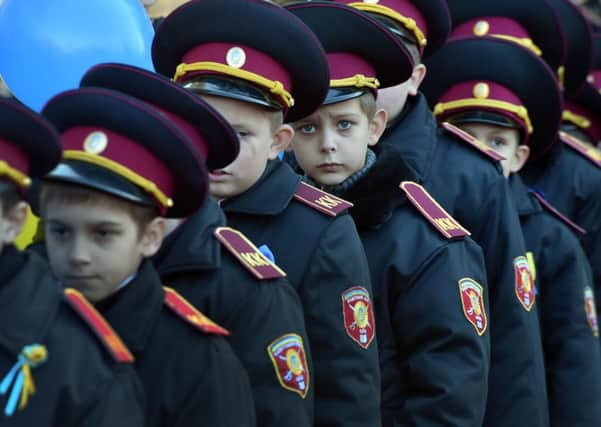Russian separatist ballot backing enrages Ukraine


The intended ballot was endorsed by Russian foreign minister Sergei Lavrov in an interview with Russian media when he stated the vote organised by the self-proclaimed Donetsk and Luhansk People’s Republics “would be important from the point of view of legitimising power”.
“We expect the elections to be held as arranged and of course we will recognise their results,” Mr Lavrov told the paper Izvestia and LifeNews TV.
Advertisement
Hide AdAdvertisement
Hide AdBut those remarks sparked fury in Kiev because it would be held in defiance of Ukrainian national elections held last Sunday in which pro-western parties triumphed.
Ukrainian foreign ministry spokesman Yevhen Perebynis said: “Today’s absolutely destructive and provocative statements by Russian representatives, including the foreign minister, will be interpreted by the terrorists as encouragement by Russia to hold the illegal elections of 2 November.
“The Kremlin is consciously making the situation worse … In such an extraordinarily fragile situation, this is an irresponsible step by Russia which can threaten the peace process.”
Ukrainian president Petro Poroshenko, whose own political group was a big winner in Sunday’s parliamentary election, also weighed in against the “pseudo-elections” planned by the rebels.
They “grossly contradicted the spirit and letter” of international agreements reached in the Belarussian capital, Minsk, in September, he was quoted as saying on his website.
Western governments, at odds with Russia over the future of Ukraine whose pro-western leadership wants to move the country westwards, have also condemned the separatist ballot.
US president Barack Obama expressed support for Kiev, saying that Washington would not recognise any election held in separatist-held areas that did not conform with Ukrainian law. The separatists see the vote as a way to underscore their independence from Kiev.
Moscow denies Ukrainian and western accusations that its troops have taken part in fighting against government forces in a conflict that has killed more than 3,700 people.
Advertisement
Hide AdAdvertisement
Hide AdAt the heart of Kiev’s dispute with Moscow is the pro-Europe direction pursued by the new leadership under Mr Poroshenko, directed at shifting the country of 46 million people further away from Russia’s orbit.
Street protests in Kiev overthrew the Moscow-backed leader, Victor Yanukovich, last February after he spurned a deal that would have deepened relations with the European Union,
Moscow denounced what it termed a “fascist coup”. Russia went on to seize and annex the Crimean peninsula and back the separatist rebellions in the Russian-speaking east which historically are closer to Russian culture and outlook.
A further irritant in relations are supplies of gas to Ukraine from Russia, its biggest energy provider. Moscow has halted gas shipments to Ukraine in a row over the price and unpaid bills, alarming the EU which gets a third of its gas needs from Russia, half of this via pipelines through Ukraine.
With the vote count almost complete in Ukraine’s election, the People’s Front of prime minister Arseny Yatseniuk held more than 22 per cent – slightly ahead of the Poroshenko bloc which was on 21.80 per cent.
With at least three other pro-Europe parties among those which are now certain to be represented in the 450-seat parliament, the outcome confirmed Ukraine’s sharp tilt towards Europe and away from Russia.